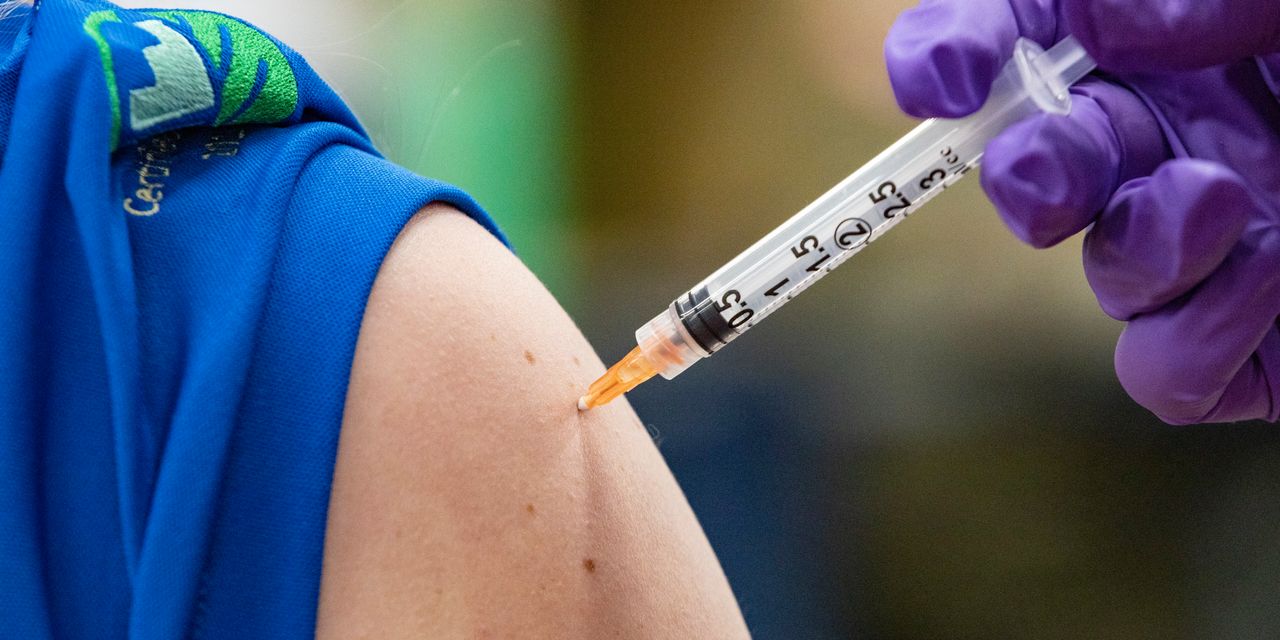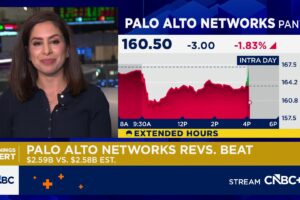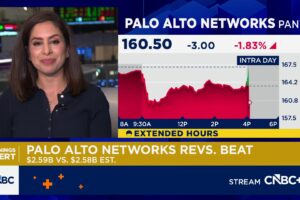
The COVID-19 vaccine rollout over the past few months has left people with plenty of questions, and the latest concerns about Johnson & Johnson’s single-dose vaccine have probably given folks even more.
We’re here to help.
The background: The Food and Drug Administration (FDA) and the Centers for Disease Control and Prevention (CDC) released a joint statement on Tuesday morning, recommending a temporary halt in the distribution of Johnson & Johnson’s JNJ, -1.34% COVID-19 vaccine while they examine six severe cases of rare blood clots that have been reported in people who have received the shot.
Health officials called for this short-term stoppage out of “an abundance of caution,” they said, emphasizing that these blood clots were “extremely rare,” and have only happened in less than one in a million vaccinated people. Specifically, just six cases of these rare blood clots have been reported among the 6.8 million Americans who have received the J&J single-dose vaccine. But the CDC wants to ensure that healthcare providers are prepared to treat blood clots if they occur.
Read more: U.S. recommends pausing use of J&J’s COVID-19 vaccine after reports of rare blood clots
So what happened? In these six cases, all of them women, a type of blood clot called a cerebral venous sinus thrombosis (CVST) was seen in combination with low levels of blood platelets (aka thrombocytopenia). One person remains in critical condition, and one died.
Dr. Reynold Panettieri, a pulmonary physician and a professor of medicine at Rutgers University, explained to MarketWatch that a CVST manifests as a stroke. “Blood clots form in the draining veins of the brain, and that backs things up and causes bleeding into the brain,” he said. They’re rare, occurring in five in a million people each year, and can be caused by certain cancers or sickle cell disease.
“ “Don’t get an anxiety reaction because remember, it’s less than one in a million.” ”
All six recorded cases of CVST and low blood platelet levels amongst the J&J vaccine recipients involved women between the ages of 18 and 48, with symptoms presenting six to 13 days after vaccination. But health officials noted that the number of these cases is so small, that they cannot generalize yet on whether this is something women of a certain age, or other demographic groups, could be at a higher risk of developing. This is why the CDC’s Advisory Committee on Immunization Practices, which recommends use of vaccines after the Food and Drug Administration authorization, will meet Wednesday to review the cases.
Coronavirus Update: U.S. COVID vaccine program faces setback with J&J jab, as experts say there is no cause for alarm
The AstraZeneca AZN, -0.47% COVID-19 vaccine, which has not been authorized in the U.S. yet, has been halted in some European countries over similar rare blood clot concerns.
This news could understandably raise alarm in those people who have already received their J&J vaccine, however, or those who are scheduled to get their shots soon. But there’s no need to panic; just pay attention to whether you have symptoms such as a severe headache, abdominal pain, leg pain or shortness of breath. If you do, seek medical attention.
“I would tell them to just, first of all, don’t get an anxiety reaction because remember, it’s less than one in a million,” said Dr. Anthony Fauci, the government’s top infectious disease expert, during a White House press conference on Tuesday.
So this is what we know about these J&J cases so far, what symptoms people should watch out for, and what you should do about any upcoming J&J vaccine appointments. Keep in mind that this information is subject to change as we learn more, so these guidelines will be updated as health officials update their recommendations.
I’ve already received my J&J shot. What should I watch out for?
The CDC and FDA say that if you suffer a severe headache, feel abdominal pain or leg pain, or start experiencing shortness of breath within three weeks after getting your J&J vaccine, you should seek medical attention or speak to your health care provider.
These blood clot symptoms should not be confused with the flu-like symptoms (fever, body aches, chills, fatigue and nausea) or swollen lymph nodes under your arms and near your collarbone, which can be a normal response to getting any of the COVID vaccines from J&J, Pfizer PFE, +0.51% or Moderna MRNA, +7.40%.
It should be noted that the blood clot events usually occurred about a week after the J&J vaccine, and no longer than three weeks after vaccination, with a median of about nine days. So if it’s been almost a month since you got your shot, then you should be in the clear.
I’m scheduled to get my J&J shot. Should I cancel my appointment, or get the Pfizer or Moderna vaccine instead?
There is no need for you to rush to cancel your appointment, although your state or vaccination site may already be canceling or rescheduling J&J appointments for now while the recommended pause is in effect. Retailers and drugstores such as Walgreens, Rite Aid RAD, -4.38%, CVS CVS, -0.59% and Wegmans have canceled their J&J appointments for the time being, for example.
Or some states, including New York and Texas, will switch to giving those people scheduled to get the J&J shot one of the other available COVID vaccines from Pfizer and Moderna, instead. Check your local health department or your vaccination site for guidance. And the pause “will not have a significant impact” on the White House’s vaccination plan, according to Jeff Zients, the White House’s COVID-19 response coordinator.
What’s more, doctors and vaccination sites can still give you the J&J vaccine. “This is a recommendation, and it’s not a mandate. It’s out of an abundance of caution,” Dr. Peter Marks, the director of the FDA’s Center for Biologics Evaluation and Research, said in a press conference on Tuesday. “If an individual health care provider has a conversation with an individual patient, and they determined that the benefit risk for that individual patient is appropriate, we’re not going to stop that provider from administering the vaccine.”
Keep in mind that tens of millions of people have already received the J&J vaccine without this severe side effect. “We have to put this into context,” said Panettieri. “It’s very important to realize that millions of people have gotten Johnson & Johnson vaccines, and have reaped the benefits of the vaccine. This is an incredibly uncommon and rare event. You’re more likely to get COVID-19 and have a serious COVID infection [if you don’t get vaccinated] than to get this complication from the vaccine.”
Who is most at risk of developing this rare blood clot/low platelet reaction from the J&J vaccine?
There are still too few cases to make any concrete connections. “Review of six is difficult to make generalizations from. We’re going to have our expert committee take a careful look,” Dr. Anne Schuchat, principal deputy director of the CDC, said during a press briefing Tuesday. “The numbers are quite small, small enough that it’s hard to generalize, but large enough that we wanted to take the action with the pause.”
Some things the cases do have in common so far, however: All six involved women between the ages of 18 and 48 years old, who developed the clots within six to 13 days of getting the J&J shot. But it’s far too soon to say that women of a certain age are at higher risk than anyone else.
But again: these blood clots are still extremely rare, and it is not at all clear whether the vaccine caused these clots. Using oral birth control pills and smoking cigarettes can also raise the risk of blood clots. “The likelihood of you having a CVST could occur from many, many more factors that people are exposed to than just this vaccine,” said Panettieri. “And remember, this kind of thrombosis occurs in five in a million people anyway. So when you’re starting to vaccinate millions and millions of people, you’re going to get some people who would have just developed this in any case.”
How long will the J&J shot be on pause? What happens next?
Dr. Janet Woodcock, the FDA’s acting commissioner, said that this pause should only last “a matter of days” during a press briefing on Tuesday morning. This could change depending on “what we learn in the next few days,” she noted.
The CDC’s Advisory Committee on Immunization Practices will hold an emergency meeting on Wednesday from 1:30 to 4:30 p.m. ET to review the cases, and this meeting will be open to public viewing. Click here for more details about tuning in; no registration is required.
The bottom line: If you’ve received the J&J vaccine, keep an eye out for symptoms of this rare blood clot, including a severe headache, abdominal or leg pain, and shortness of breath within three weeks of getting your shot. But these blood clots are so rare — being recorded in less than one in a million people who’ve received their J&J shots — that there is no need to panic or rush to cancel an upcoming J&J vaccine appointment. Your vaccination site or local health department may be rescheduling appointments or swapping J&J vaccines for other vaccines, however, so check with your vaccination site to see how this could impact your future appointment.
“The takeaway message here is, the single most important thing people can do is get vaccinated,” said Panettieri. “Not to get vaccinated would put you at such an enhanced risk of death from COVID, or serious risk from COVID, that I would not be worried about these isolated and very rare cases of blood clots.”








